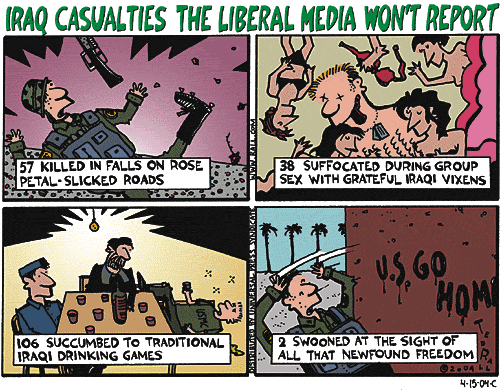
ted_rall.gif, image/png, 500x391
Psychologists have noted that young children are prone to "magical thinking" -- the belief that if one wants something to be true, it is true. The Iraq hawks have engaged in magical thinking throughout the Iraq mission.

ted_rall.gif, image/png, 500x391
Hawks Didn't See What Was Coming in Iraq
Cato Institute, April 21, 2004
In the world of nature, hawks are renowned for their keen eyesight. But the hawks on Iraq policy have not displayed that quality of their avian models. Indeed, they have failed to see the most obvious pitfalls of their strategy from day one.
Take their prediction that the Iraq mission would be, in the words of Kenneth Adelman, former head of the Arms Control and Disarmament Agency, a "cake walk." It has proven to be anything but. Nor is their latest response -- that they meant only that the initial military operation would be easy -- anything other than a lame excuse. As baseball great Yogi Berra once said: "It ain't over 'til it's over." Wars are not decided just by their initial engagements. If they were, World War II would have ended with a Japanese victory, given the empire's successes at Pearl Harbor and elsewhere in the Pacific during the first year. Opponents of the Iraq war predicted that the aftermath would be a prolonged and bloody mess, but the hawks responded to such warnings with derision.
The Bush administration and its hawkish supporters have not fared much better with their other predictions. For example, the Pentagon assumed that the United States would be able to begin drawing down its occupation forces almost immediately. By the autumn of 2003, we were supposed to be down to 30,000 troops. Instead, more than 130,000 troops remain in Iraq and trial balloons continue to float aloft that we will need to send more.
The rosy scenario about troop levels was based on the belief that the overwhelming majority of Iraqis would greet the invading forces as liberators, and that the United States would be able to install Ahmed Chalabi and the Iraqi National Congress as a successor government almost immediately. Instead, it turned out that Chalabi's domestic support was minimal and the INC was regarded by most Iraqis as nothing more than a group of pampered U.S. puppets.
A comprehensive poll conducted by ABC News and other organizations last month showed that, outside the Kurdish community, Iraqis are evenly divided about whether the war was a liberation or a "humiliation." Similarly, sentiment is evenly split about whether the occupation should continue or end promptly. Perhaps most worrisome, more than 20 percent of Arab Iraqis endorse violent attacks on U.S. forces. Even before the upsurge of violence in early April, that last result indicated that the insurgency is supported by far more than a handful of Saddam Hussein "dead enders" and foreign terrorists, as the hawks had argued for so long.
Then there was Deputy Secretary of Defense Paul Wolfowitz's prediction last spring that Iraqi oil revenues would pay all the costs of reconstructing the country. Instead, we have already spent nearly billion in reconstruction aid -- with no end in sight.
Finally, there were the predictions that we would find vast quantities of weapons of mass destruction in Iraq. Indeed, the existence of such weapons was the primary justification for going to war. To date, we have found no WMD, and it is increasingly unlikely that we ever will. The United States has had control of Iraq for more than a year and has captured most of the Iraqi scientists and officials of the Saddam government. How credible is it that none of these people has come forward with information about WMD stockpiles, given the lucrative rewards the Bush administration would give for such information?
Given the dismal track record of the hawk faction, we should be wary about taking that faction's advice in the future. Yet the same people who have been so wrong about Iraq policy in the past now contend that we have no choice but to "stay the course" regardless of cost or risk. We should not listen to them.
Psychologists have noted that young children are prone to "magical thinking" -- the belief that if one wants something to be true, it is true. Adults know that wishing does not determine reality. The Iraq hawks have engaged in magical thinking throughout the Iraq mission, and they continue to do so. It is time to turn Iraq policy over to foreign policy adults.
--- Ted Galen Carpenter, vice president for defense and foreign policy studies at the Cato Institute, is a member of the Coalition for a Realistic Foreign Policy and the author or editor of 15 books on international affairs.
www.cato.org/dailys/04-21-04.html
Original: A Priceless Cake Walk